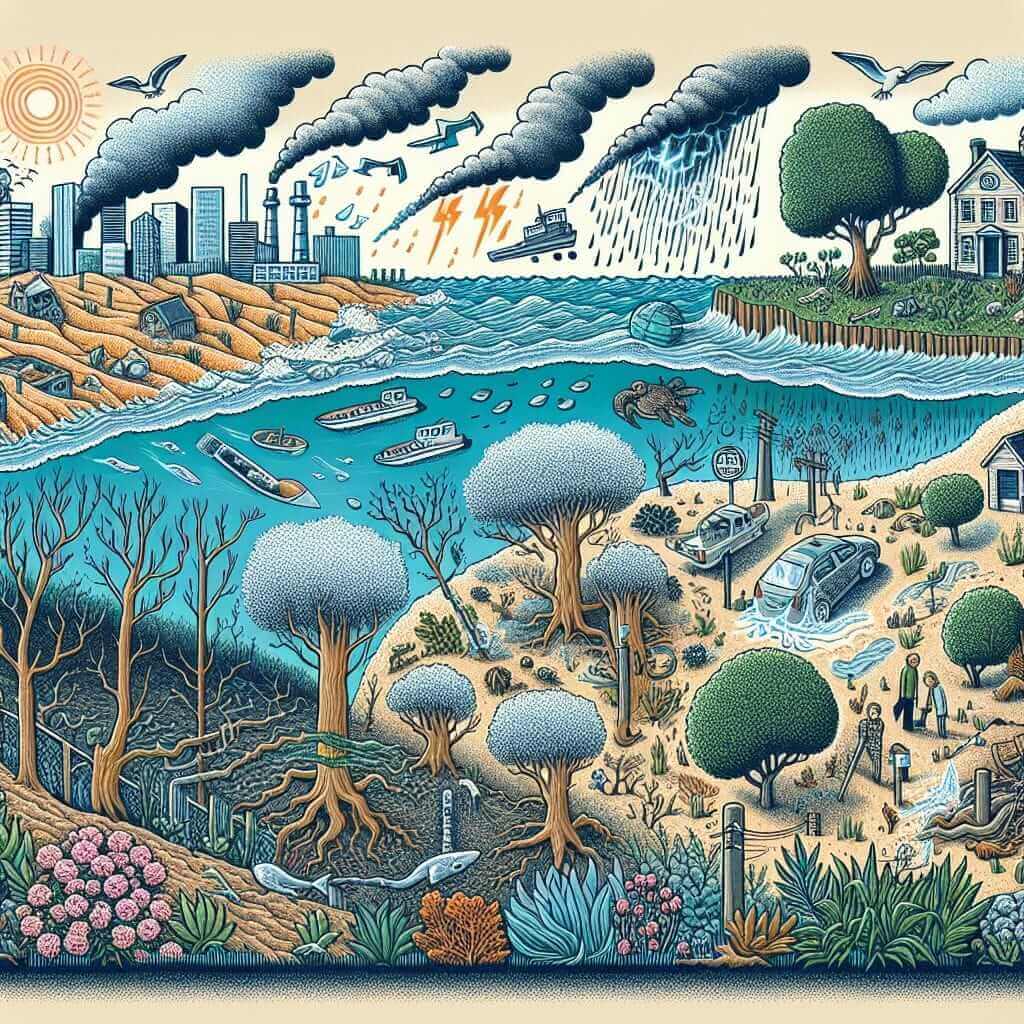The IELTS Reading test is a critical part of the IELTS examination, designed to evaluate your ability to understand academic texts. The topic “What are the impacts of climate change on coastal ecosystems?” is highly relevant and frequently appears in the context of IELTS Reading due to its global importance and widely documented research. Understanding this topic will not only help you prepare for your IELTS exam but also make you more knowledgeable about current environmental issues.
In this article, we provide a detailed sample IELTS Reading test on this topic, accompanied by questions and answers, along with explanations and useful vocabulary. We will also include grammar points to watch out for and some useful tips to excel in the Reading test.
IELTS Reading Practice Test: Impacts of Climate Change on Coastal Ecosystems
Reading Passage
Coastal ecosystems around the world are significantly impacted by climate change. These impacts include rising sea levels, increased temperatures, and more severe weather events. These changes affect biodiversity and the health of human communities that depend on these ecosystems.
Rising sea levels, primarily due to the melting of polar ice caps and thermal expansion of seawater, threaten to submerge coastal habitats. Mangroves, salt marshes, and estuaries are particularly vulnerable. For example, the loss of mangrove forests can lead to decreased fish populations, as these areas provide essential nursery habitats for many marine species. Additionally, saltwater intrusion into freshwater systems alters the water chemistry, negatively impacting species that cannot tolerate higher salinity.
Higher temperatures also pose a threat to coastal ecosystems. Coral reefs, for instance, are experiencing bleaching events more frequently, where corals expel the symbiotic algae living in their tissues due to stress from increased water temperatures. This not only affects the corals but also the myriad species that depend on coral reefs for food and shelter.
Storms and other severe weather events are becoming more frequent and intense due to climate change. These events can cause significant physical damage to coastal habitats. For example, hurricanes can uproot seagrass beds and damage coral reefs, while storm surges can erode coastlines and damage human infrastructure.
Such changes in coastal ecosystems have profound effects on human communities. Many coastal areas are inhabited by populations that rely heavily on marine resources for their livelihoods, such as fishing and tourism. The degradation of these ecosystems can lead to economic losses and food insecurity. Furthermore, the loss of natural coastal barriers like mangroves and wetlands increases the risk of flooding and storm surges, thereby endangering lives and property.
In conclusion, the impacts of climate change on coastal ecosystems are varied and far-reaching, threatening both environmental sustainability and human well-being. Addressing these challenges requires concerted global efforts to mitigate climate change and implement adaptive measures to protect these vital ecosystems.

Questions
Multiple Choice
-
Which of the following is NOT mentioned as an impact of rising sea levels?
- A. Submersion of coastal habitats
- B. Increased fish populations
- C. Saltwater intrusion
- D. Altered water chemistry
-
What is a direct consequence of coral bleaching?
- A. Higher fish populations
- B. Increased tourism revenue
- C. Corals expelling symbiotic algae
- D. Decrease in water temperature
Identifying Information (True/False/Not Given)
-
Mangrove forests are essential nursery habitats for marine species.
- A. True
- B. False
- C. Not Given
-
Higher temperatures have no significant effect on coastal ecosystems.
- A. True
- B. False
- C. Not Given
Sentence Completion
- Many coastal areas are inhabited by populations that rely heavily on marine resources for their __.
Answer Key
- B. Increased fish populations
- C. Corals expelling symbiotic algae
- A. True
- B. False
- livelihoods
Common Mistakes and Tips
Common Mistakes
- Not reading the questions carefully and missing key details in the passage.
- Misinterpreting “Not Given” statements as either “True” or “False”.
- Overlooking the context of sentence completion questions, leading to incorrect answers.
Tips
- Skim the passage first to get a general understanding before diving into the questions.
- Pay close attention to keywords in questions and match them with the passage.
- Don’t spend too much time on one question; move on and come back if needed.
Vocabulary
- Submersion (n): /səbˈmɜːrʒən/ – The act of being submerged underwater.
- Intrusion (n): /ɪnˈtruːʒən/ – The act of entering something where one is unwelcome.
- Bleaching (n): /ˈbliːtʃɪŋ/ – The process of becoming white or losing color.
Grammar Focus
Passive Voice
The passage uses passive voice frequently to describe processes and consequences, e.g., “are impacted by”, “are provided by”. Understanding the passive voice is crucial for IELTS Reading comprehension.
Example:
- Active: Rising sea levels threaten coastal habitats.
- Passive: Coastal habitats are threatened by rising sea levels.
Conclusion
To excel in the IELTS Reading test, practice regularly with passages on current and relevant topics, such as climate change and its impacts on coastal ecosystems. Familiarize yourself with different types of questions and improve your vocabulary and grammar to increase your accuracy and speed.
For further practice, check out these related articles:
Stay diligent, and good luck with your IELTS preparation!